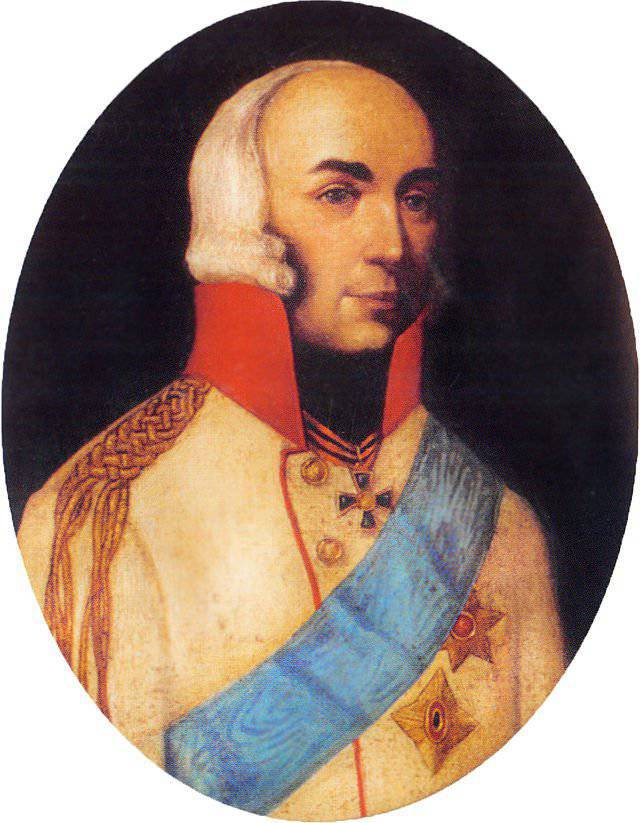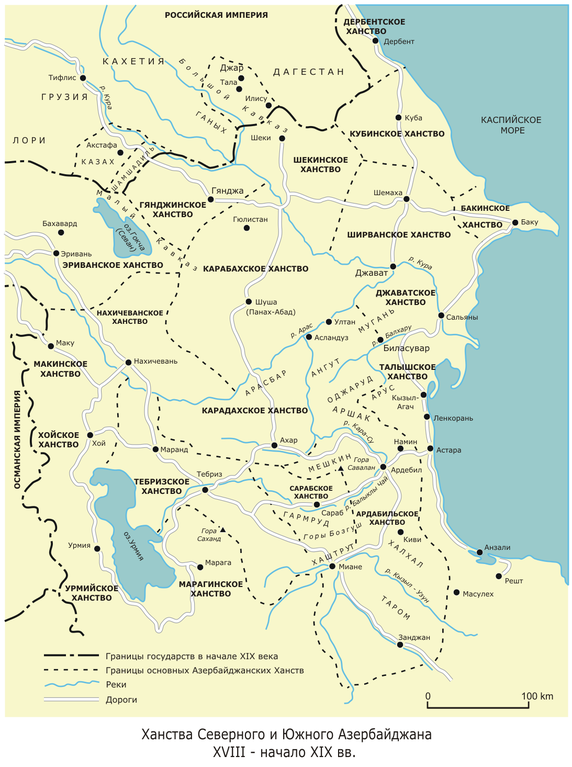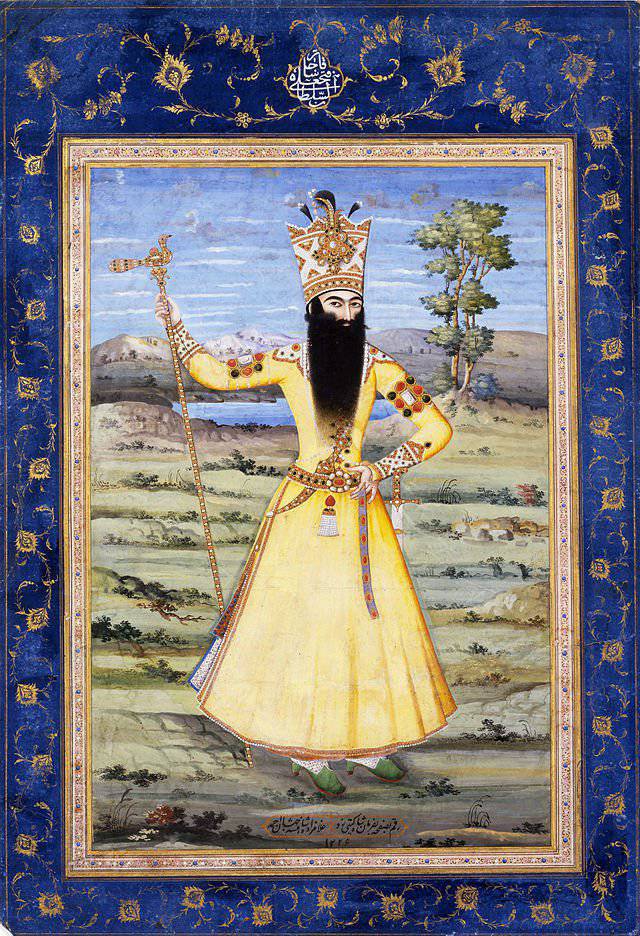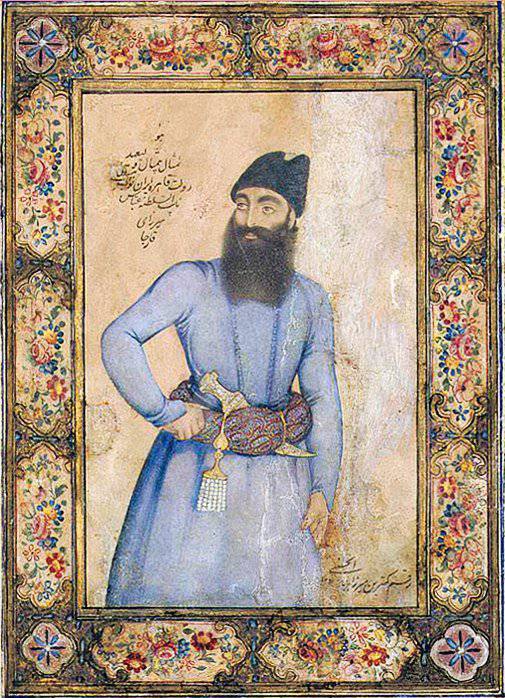War with Persia 1804 — 1813's
In 1812, a decisive breakthrough was achieved in the Persian campaign. In the two-day battle (the battle of Aslanduz 19 — October 20 1812) 2-thousand. a Russian detachment under the command of Peter Kotlyarevsky utterly defeated the 30-thousandth Persian army led by the heir to the Persian throne Abbas-Mirza, and then stormed Lenkoran. This made Persia ask for peace.
prehistory
The advance of Russia in the Transcaucasus met at first hidden, and then open resistance to Persia. Persia was an ancient regional power, which for more than a century had fought for dominance in the Caucasus with the Ottoman Empire. The advancement of Russian influence in the Caucasus met with resistance from these two powers, which were traditional rivals.
In 1802, Pavel Dmitrievich Tsitsianov was appointed Governor-General of the Astrakhan Province, Military Inspector of the Caucasus Corps, and Commander-in-Chief of the troops in the newly annexed Georgia (Conqueror of the Caucasus Prince Pavel Dmitrievich Tsitsianov. The assault of Ganja; Part 2). This commander and statesman, of Russian Georgian origin, was an active conductor of imperial politics in the Caucasus. Prince Pavel Dmitrievich did a great job of expanding the Russian territory in the Caucasus. Tsitsianov proved to be a talented administrator, diplomat and commander, who, partly by diplomatic means, partly was able to incline to the side of Russia various feudal rulers on the coast of the Caspian Sea, in Dagestan and Transcaucasia. General Tsitsianov had relatively small forces of the regular army, preferring to negotiate with local rulers. He attracted the mountain rulers, the khans and the local nobility with gifts, conferring officer and sometimes even general rank, paying a permanent salary from the treasury, awarding orders and other signs of attention. Negotiating always preceded the military campaign of the prince-governor. At the same time, Prince Tsitsianov relied on detachments of local princes and khans, taking the side of Russia, recruited volunteers from local residents.
It should be noted that the accession of various state entities in the Caucasus to Russia and individual tribes that have not yet grown to the level of the state was an objective good for the vast majority of their population. The Russian empire gave them protection from the terrible consequences of the Persian and Turkish invasions, which for many years, if not decades, devastated entire areas. People were exterminated and many thousands taken into slavery or resettled in the interests of Persia and Turkey. At the same time, Russia saved many Christian or semi-pagan peoples from complete extermination and Islamization. At the same Georgia in her historical perspective there was no other way but to go under the protectorate of the Russian Empire.
The arrival of Russian people in the Caucasus led to progress in cultural, material and economic life, increased the well-being of people. The infrastructure of the region developed, cities, roads, schools were built, industry and trade developed. Wild customs and phenomena, such as open and mass slavery, constant internecine slaughter, raids, and theft of people for sale into slavery, went into the past. The mayhem and absolute power of the local khans, princes and other feudal lords disappeared into the past. It was in the interests of ordinary people, although it violated the interests of a narrow group of feudal lords. On the other hand, those Caucasian feudal lords who honestly served the empire, calmly sought the highest positions, there was no discrimination based on nationality.
Tsitsianov effortlessly achieved the accession of Mingrelia to Russia (Georgia was not united then and consisted of several state entities). The sovereign prince of Mingrelia, George Dadiani, in 1803, signed “pleading clauses”. In 1804, these points were also signed by the King of Imeretia, Solomon II, and the ruler of Guria, Prince Vakhtang Gurieli. At the same time, the small khanates and sultanates of Northern Azerbaijan voluntarily entered into Russia. Many of them were previously in vassal dependence on Persia. The commander-in-chief of Georgia, Tsitsianov, persistently, step by step, took the Transcaucasian lands out of the influence of the Persian Power, primarily in northern Azerbaijan. Moreover, the prince did this consistently, moving towards the Caspian Sea and the Araks River, behind which the actual Persian lands, South Azerbaijan, were located. This ensured the security of Georgia, which until recently had constantly suffered from the raids of Muslim neighbors. From 1803, Russian troops, with the support of local volunteer forces (Caucasian militia), began to subordinate the lands located north of the Araks River.

One of the conquerors of the Transcaucasus Pavel Dmitrievich Tsitsianov
Only the Ganja Khanate, a feudal possession that once belonged to the Georgian kings, was able to seriously oppose the attack of Tsitsianov. The Ganja khanate had a strategic position, in the northeast bordered by the Shchekino khanate; East and southeast bordered on the khanate of Karabag (or Karabakh, Shusha); and in the south, southwest - with Erivan; in the north-west - with the Shamshadil sultanism; in the north - with Kakheti. Such a strategically advantageous location made the khanate a key to Northern Azerbaijan. During the Zubov campaign in 1796, Ganja Javad Khan voluntarily took the oath of allegiance to Russia, her empress Catherine II, but after the withdrawal of the Russian troops, she broke the oath. Javad Khan helped the Persian invasions of Georgian lands in every possible way, receiving his share of the spoils of war, moreover, supported any anti-Russian intrigues of local feudal lords. The problem needed to be solved.
Tsitsianov tried to resolve the issue peacefully. However, the ruler of Ganja (Gandzhi), a clever Javad Khan, being aware of the small number of Russian troops in the Caucasus, refused to stop anti-Russian activities. Prince Tsitsianov responded with a military campaign. Tsitsianov, arriving Shamkhor, once again offered to resolve the matter with the world, reminding Javad Khan that he had sworn allegiance to Russia and demanded that the fortress be surrendered. The feudal ruler did not give a direct answer. 3 January 1804, the Russian troops stormed Ganja by storm. Javad Khan fell during the bloody battle. The Ganja Khanate was liquidated and became part of the Russian Empire, as Elizavetpolsky district. Ganja was renamed in honor of Empress Elizabeth Alekseevna - in Elizavetpol. The fall of the powerful fortress of Ganja, which was defended by the 20 thousand garrison, made a great impression on the Shah of Persia, as well as on the rulers of the Azerbaijani khanates.
It is clear that Persia was not going to cede the Caucasus to Russia. For decades, the military campaigns in the Caucasus brought the Persian military elite a huge income from robbery and theft to sell tens of thousands of people into slavery. Neither Istanbul nor Tehran did not want to recognize the acts of accession of the Caucasian peoples and regions to the Russian Empire, demanding the departure of the Russians right up to the Terek. The Persians decided to start a war, while the Russians were not entrenched in the new domains.

The interests of England and France
The advance of Russia was confronted with the geopolitical interests of France and England. Paris and especially London had their own interests in Asia Minor and Persia. England was afraid for her pearl in the British crown - close to Persia, India. Therefore, every step of Russia to the south caused concern of London. The Persian campaigns of Peter I and Zubov on the orders of Catherine (How Peter I cut the door to the East; Part of 2; Punishing non-peaceful Persia - 1796 campaign of the year) have already annoyed England. Especially great fear in England was caused by the order of Paul I about going to India. True, the emperor-knight managed to kill. However, Russia continued to advance in the Caucasus and could sooner or later reflect on the benefits of access to the Persian Gulf and India, which frightened the British elite. Therefore, England actively incited Persia and Turkey against Russia, which were to prevent the Russians from reaching the Persian Gulf and the Indian Ocean. In the Great Game, this step of Russia led to its complete domination in Eurasia, which dealt a fatal blow to the Anglo-Saxon project to build the New World Order.
The importance of this region was well understood by Napoleon Bonaparte, who had dreamed all his life about going to India. He planned to take Constantinople, and from there move to Persia and India. In 1807, French military instructors, led by General Gardan, arrived in Tehran and set about reorganizing the Persian army along European lines. Created infantry battalions, built fortifications and artillery factories. True, Persia soon broke off the contract with the French, and from 1809, British officers began to engage in the reform of the Iranian army. Russia at that time was the enemy of England.
General Sir John Malcolm arrived in Persia, with him there were 350 British officers and non-commissioners. The Persian Shah was presented with 30 thousand guns, 12 guns and cloth for uniforms for sarbaz (the so-called new Persian regular infantry). The British promised to prepare 50 thousand army. In March 1812, Britain and Persia entered into a military alliance against Russia. England allocated money to continue the war with Russia (they gave money for three years of the war) and promised to create a Persian military in the Caspian flotilla. The English ambassador of Horus Uzli promises Persia to return Georgia and Dagestan. New British military advisers arrived in Persia.
The beginning of the war with Persia
In the summer of 1804, the fighting began. The reason for the war was the events in Eastern Armenia (The beginning of the Russian-Persian war 1804 — 1813 Battle for Erivan Khanate). The owner of the Erivan Khanate, Mahmud Khan, addressed the Persian ruler Feth Ali Shah (1772 - 1834) with a vassal request to support him in his claims to the complete domination of Armenia. Persia supported Mahmud Khan.
Meanwhile, Tsitsianov received disturbing information from Persia and the Transcaucasian possessions. There were rumors of a huge Persian army, which would pass through the Caucasus with fire and sword and throw the Russians outside the Terek. In Tehran, an open challenge was made to Russia: the Shah solemnly “granted” Georgia, which was part of the Russian Empire, to the runaway Georgian “Tsarevich” Alexander. As a result, the war was given a "legitimate" character. Allegedly, the Persians are going to “liberate” Georgia from the “Russian occupation”. This event had a great resonance in the Caucasian lands. The Persians conducted an active propaganda campaign, calling on the Georgian people to revolt and throw off the “Russian yoke”, to recognize the “legitimate king”.
The son of Feth Ali Shah, the crown prince Abbas Mirza, who was commander in chief of the Persian army and led Persia’s foreign policy, as well as the Erivan khan Makhmud sent ultimatum letters to Prince Tsitsianov. They demanded the withdrawal of Russian troops from the Caucasus, otherwise the Persian Shah "will be angry" and punish the "infidels." Pavel Dmitrievich answered beautifully and clearly: “Stupid and bold letters, what was Khan, with writing to him more and commands, the words of a lion, and the affairs of the calf, Baba Khan (the author was called the Shah of Persia in his youth), the Russians used to answer bayonets ... ". In addition, the Georgian governor demanded the release of Patriarch Daniel and return him to his post. In the 1799 year, after the death of the Armenian Patriarch, the Russian Empire supported the candidacy of Daniel, who received the majority of votes in the elections. But the Erivan khan Mahmoud, hoping for the support of Persia, ordered the arrest of Daniel, and put his protege, David, in his place.
Numerous Persian troops violated the Russian border, attacked the border posts. The ruler of Erivan collected 7-th. squad. In Tabriz (Tabriz), the capital of South Azerbaijan, 40-thousand was concentrated. Persian army. The balance of power was in favor of Persia and its allies. This allowed the Persians to present the brazen ultimatums of Russia. Before 1803, Prince Tsitsianov had only 7 thousand soldiers. The Russian grouping in Transcaucasia included: Tiflis, Kabardian, Saratov and Sevastopol musketeers, the Caucasian Grenadier, Nizhny Novgorod and Narva dragoon regiments. Only since 1803, has the Russian military presence in Georgia been somewhat strengthened. A huge numerical advantage was on the side of Persia.
In addition, Tehran knew about the foreign policy problems of Russia. The war between Russia and Napoleonic France (III anti-French coalition) and the Ottoman Empire was brewing. Therefore, the Russian government could not allocate significant forces and resources to keep the occupied Caucasian regions. All resources were connected by European affairs. Tsitsianov could rely only on the forces at hand.
Tsitsianov, brought up on the Suvorov offensive strategy and tactics, did not wait for the enemy invasion and sent troops into the Erivan khanate, the former vassal of Persia. The prince planned to seize the strategic initiative in the war and hoped for the high fighting qualities of Russian soldiers and officers. 8 June 1804, the advance guard of the Tsitsianov detachment under the leadership of S. Tuchkov, spoke in Erivan. On June 10, at the Gyumri (Gumry) hole, the Russian squad defeated the enemy cavalry under the authority of the “tsar” Alexander and his brother Teimuraz.
On June 19-20, Tsitsianov’s detachment (4,2 thousand people with 20 guns) approached Erivan. However, the 20-th. army (12 thousand infantry and 8 thousand cavalry) of the Persian prince Abbas-Murza. 20 June was the battle of the main forces of Tsitsianov and Abbas-Mirza. The attacks of the Persian cavalry from the front and the flanks were repulsed by the Russian infantry. By evening, the Persian cavalry ceased fruitless attacks and retreated. Tsitsianov's detachment did not have the strength to simultaneously confront the Persian army and besiege the fortress. Therefore, Tsitsianov first decided to oust the Persians from the Erivan Khanate, and then proceed to the siege. From 20 to 30 June, a series of small and significant armed clashes occurred, in which the Persians were gradually crowded. Russian troops occupied the village of Kanagir, a well-fortified Echmiadzin monastery.
30 June a new decisive battle took place. The Russian detachment passed by the Erivan Fortress, and moved to the Persian camp, located 8 versts from the city. Abbas-Mirza received reinforcements by increasing the army to 27 thousand people, and hoped to win over the 4 thousand Tsitsianov detachment. He was an experienced commander, having commanders under the command who had already gone on campaigns to the Caucasus. In addition, the Persian army was trained by English and French instructors.
However, the attack of the numerous Persian army did not bother Tsitsianova. The attacks of the Persian cavalry reflected the salvoes of 20 guns, put in the first line. The Shah's cavalry was upset and retreated in disarray. Abbas-Mirza did not dare to withdraw the infantry and retreated after Araks. There was simply no one to pursue the Persians. Tsitsianov practically had no cavalry. Only a few dozen Cossacks rushed to the enemy, crossing the river, and seized several banners and guns.
Having set up posts on the river, Tsitsianov returned to the fortress. The city had double stone walls with 17 towers, it was defended by 7 thousands of Khan warriors and several thousand militiamen. True, there were few guns, just 22 guns. The task was difficult, especially in the absence of siege artillery. While preparing for the siege, the message came about the approach of 40-thousand. Persian army. It was headed by Shah Fath Ali himself. The enemy planned a double strike - from the side of the fortress and the river, to destroy a small detachment of Tsitsianov. However, Tsitsianov hit the first, defeated the army of Mahmud Khan, who barely managed to escape behind the gates of the fortress and the vanguard of the Persian army.
Being at the fortress lost its meaning. There was no siege artillery, ammunition and provisions ended. The soldier was not enough for a complete blockade, the fortress did not experience any problems with the supply. Mahmud Khan, knowing of the small number of the Russian detachment, the absence of heavy artillery, the problems with supplies and hoping for the help of the Persians, persisted, he was not going to surrender. The Persians devastated all the surroundings. Communications were cut, cavalry for their protection was not. The Georgian squad and the detachment of 109 people, led by Major Montresor, were sent to the rear. Georgian squad showed carelessness, settling on a night rest without appropriate precautions and was destroyed. The detachment of Montresor, refused to surrender and fell in an unequal battle with the enemy's 6 thousand cavalry detachment. For the Tsitsianov detachment, the threat of famine appeared.
Tsitsianov in the autumn lifted the siege and retreated. Thousands of Armenian families left with the Russians. The 1804 campaign of the year cannot be blamed on General Tsitsianov. His squad did everything possible and impossible in such a situation. Tsitsianov prevented the invasion of the Persian army in Georgia, inflicted several heavy defeats on the Persians, forcing the enemy forces that were far superior to the Russian detachment to retreat, and retained its detachment in the most difficult conditions.

Persian Shah Feth Ali Shah

The commander of the Persian army, Prince Abbas Mirza
To be continued ...
Information